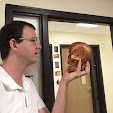This chapter finds its exigency and momentum in stories and anecdotes from Welch's own experiences and from one of her students. She turns to theories, for the most part, to highlight the inadequate responses they've enabled their proponents to articulate in the face of serious political realities.
What Welch advances is a pedagogical imperative that students be offered in writing classes opportunities to practice the full range of rhetorical strategies that mightenable them both to investigate questions/issues and to represent (and defend) their answers to a publics that might not agree with them.
This text challenges me to more fully engage students with the rhetorical possibilities of audience and argument to take up more thoughtfully and carefully with them issues of disagreement and clear opposition and how to respond to challenges they might encounter, especially when voicing minority views ( for example, opposition to war in the midst of "patriotic zeal").

2 comments:
Interesting thoughts, TJ. I found the text to be inspiring about how we can engage public writing with students. I like your description of what this chapter does in paragraph 2 above.
I also was challenged though by the binary characterization of feminist rhetoric in two modes--maternal and postmodern. There is actually a lot in-between those two areas of feminist thought (she does cite Jarratt in that chapter who doesn't fit in either camp). I wondered why Welch didn't connect her opening insights about rhetorical history done by feminist rhetoricians (see page 5) to the work she is doing in the chapter on maternal vs. postmodern feminists. The feminist work she cites on page 5 would seem to offer a third alternative. There is also the work of those of us who do materialist and transnational feminisms (i'm thinking of Hesford's work here). Welch seems to ignore or not refer to whole parts of feminist rhetoric in this chapter, which I can understand in terms of controlling subject matter and not having space to do any kind of survey/overview. I do think her critique of feminist rhetorics in these two veins is interesting, but I wonder at the choice to select only two aspects and not address the rich whole or at least indicate the range/scope of feminist rhetorics. I think this gets at a tendency to binarize in the book. I really like the book, but I also see a lot of binaries in it that I wonder about such as academics vs. activists and postmodern feminists vs. maternalist feminists
On the other hand, some of these issues are framed binaristically in our larger culture : neoliberals vs. socialists, for instance. But I always wonder how effective such binaries really are in scholarship. Binaries are always useful in political campaigns and activist strategies, in large part, but how useful in an academic book? What gets lost?
These comments are not meant to take away from Welch's significant argument, but are questions I have about how the study of feminist rhetoric is framed in this chapter. I also wonder about how Welch sees herself as a feminist rhetorician within all these positions?
Eileen
I wondered about the binary construction of feminist discourse as well, Eileen. And you're right about Jarratt's work, which offers a way to construct feminist arguments in writing classrooms that is postmodern and that is not binary or grounded in indefinite hesitation. The way you present the broader discursive situation in which she (and all of us) must contend (popular appeals to binaries) may have influenced the delivery of her materials--a point that leads us to the question you raise about the rhetorical nature of scholarship and how Welch is, in a way, working against our expectations as an academic audience.
TJ
Post a Comment